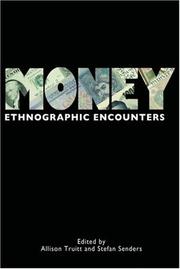| Listing 1 - 3 of 3 |
Sort by
|
Book
ISBN: 0295992751 0295992743 0295804629 9780295804620 9780295992754 9780295992747 Year: 2013 Publisher: Seattle : University of Washington Press,
Abstract | Keywords | Export | Availability | Bookmark
 Loading...
Loading...Choose an application
- Reference Manager
- EndNote
- RefWorks (Direct export to RefWorks)
"The expanding use of money in contemporary Vietnam has been propelled by the rise of new markets, digital telecommunications, and an ideological emphasis on money's autonomy from the state. People in Vietnam use the metaphor of "open doors" to describe their everyday experiences of market liberalization and to designate the end of Vietnam's postwar social isolation and return to a consumer-oriented environment. Dreaming of Money in Ho Chi Minh City examines how money is redefining social identities, moral economies, and economic citizenship in Vietnam. It shows how people use money as a standard of value to measure social and moral worth, how money is used to create new hierarchies of privilege and to limit freedom, and how both domestic and global monetary politics affect the cultural politics of identity in Vietnam. Drawing on interviews with shopkeepers, bankers, vendors, and foreign investors, Allison Truitt explores the function of money in everyday life. From counterfeit currencies to streetside lotteries, from gold shops to crowded temples, she relates money's restructuring to performances of identity. By locating money in domains often relegated to the margins of the economy--households, religion, and gender--she demonstrates how money is shaping ordinary people's sense of belonging and citizenship in Vietnam"--
Money --- Consumer behavior --- Monetary policy --- Social aspects --- Monetary management --- Behavior, Consumer --- Buyer behavior --- Decision making, Consumer --- Currency --- Monetary question --- Money, Primitive --- Specie --- Standard of value --- Economic policy --- Currency boards --- Money supply --- Human behavior --- Consumer profiling --- Market surveys --- Exchange --- Finance --- Value --- Banks and banking --- Coinage --- Currency question --- Gold --- Silver --- Silver question --- Wealth --- E-books

ISBN: 9781845207502 1845207505 9781845207519 1845207513 9786612473715 1474215289 1282473719 1847883400 1003086128 1000183882 1000180700 9781003086123 9781000180701 9781000183887 9781847883407 9781000187335 1000187330 0571344356 9781474215282 9781282473713 6612473711 Year: 2007 Publisher: Oxford New York Berg
Abstract | Keywords | Export | Availability | Bookmark
 Loading...
Loading...Choose an application
- Reference Manager
- EndNote
- RefWorks (Direct export to RefWorks)
"'Film-making is an agonizing struggle. It is in itself a quest for truths, for understanding.' -- John Boorman. June 1982. John Boorman, director of Deliverance and Excalibur, arrives in Los Angeles to raise finance for a film based on a newspaper account of a young American boy who was kidnapped by Brazilian Indians and whose father spent ten years searching for his lost child. March 1985. The film The Emerald Forest is sneak-previewed to audiences in Dallas and San Diego. This diary chronicles the three-year journey John Boorman undertook to make this film. This quest took him into the tangled, but fascinating, jungle of Hollywood (its studios, lawyers, financiers), involved him in the complex manoeuvrings that went on within England's Goldcrest organization, and sent him on a journey through the rain forest and rivers of Brazil."--
Anthropology --- Field work --- Finance --- Fieldwork --- Research grants --- Research --- Human beings --- #SBIB:39A2 --- #SBIB:303H12 --- Antropologie: methoden en technieken --- Methoden en technieken: sociale wetenschappen --- Primitive societies --- Social sciences --- Motion picture producers and directors --- Boorman, John, --- Emerald forest. --- Boorman, John --- Emerald Forest, The --- Screenwriting
Book

ISBN: 1501719823 1501721348 9781501719820 9781501719837 1501719831 9781501721342 Year: 2018 Publisher: Ithaca, NY
Abstract | Keywords | Export | Availability | Bookmark
 Loading...
Loading...Choose an application
- Reference Manager
- EndNote
- RefWorks (Direct export to RefWorks)
With essays covering diverse topics, from seafood trade across the Vietnam-China border, to street traders in Hanoi, to gold shops in Ho Chi Minh City, Traders in Motion spans the fields of economic and political anthropology, geography, and sociology to illuminate how Vietnam's rapidly expanding market economy is formed and transformed by everyday interactions among traders, suppliers, customers, family members, neighbors, and officials.The contributions shed light on the micropolitics of local-level economic agency in the paradoxical context of Vietnam's socialist orientation and its contemporary neoliberal economic and social transformation. The essays examine how Vietnamese traders and officials engage in on-the-ground contestations to define space, promote or limit mobility, and establish borders, both physical and conceptual. The contributors show how trading experiences shape individuals' notions of self and personhood, not just as economic actors, but also in terms of gender, region, and ethnicity. Traders in Motion affords rich comparative insight into how markets form and transform and what those changes mean.Contributors:Lisa Barthelmes, Christine Bonnin, Gracia Clark, Annuska Derks, Kirsten W. Endres, Chris Gregory, Caroline Grillot, Erik Harms, Esther Horat, Gertrud Hüwelmeier, Ann Marie Leshkowich, Hy Van Luong, Minh T. N. Nguyen, Nguyen Thi Thanh Binh, Linda J. Seligmann, Allison Truitt, Sarah Turner
Markets --- Street vendors --- Street people (Street vendors) --- Vendors, Street --- Merchants --- Peddlers --- Vending stands --- Public markets --- Commerce --- Fairs --- Market towns --- market socialism, mobility, economic transformation, gender, ethnicity. --- Small business --- Business networks --- #SBIB:39A4 --- #SBIB:39A75 --- Business networking --- Networking, Business --- Networks, Business --- Social networks --- Industrial clusters --- Strategic alliances (Business) --- Businesspeople --- Toegepaste antropologie --- Etnografie: Azië --- E-books
| Listing 1 - 3 of 3 |
Sort by
|

 Search
Search Feedback
Feedback About UniCat
About UniCat  Help
Help News
News